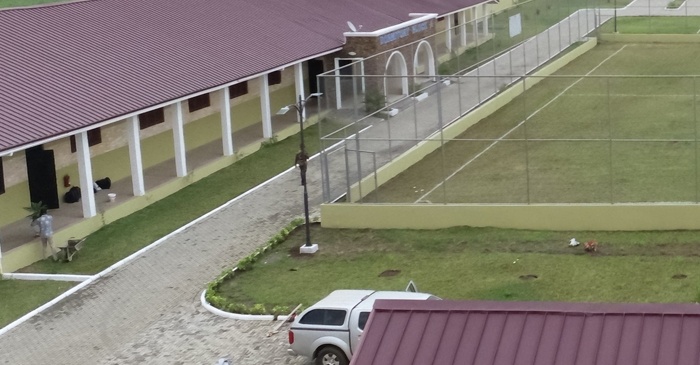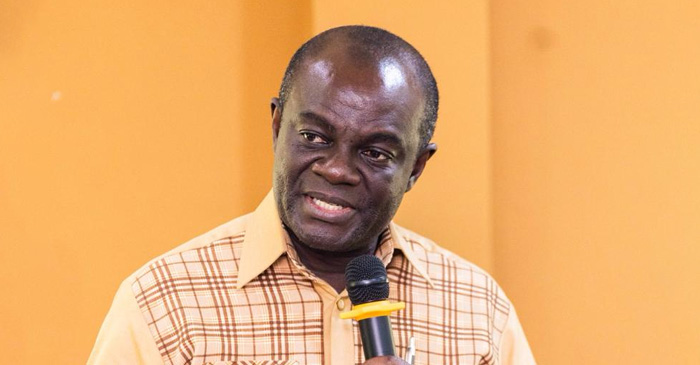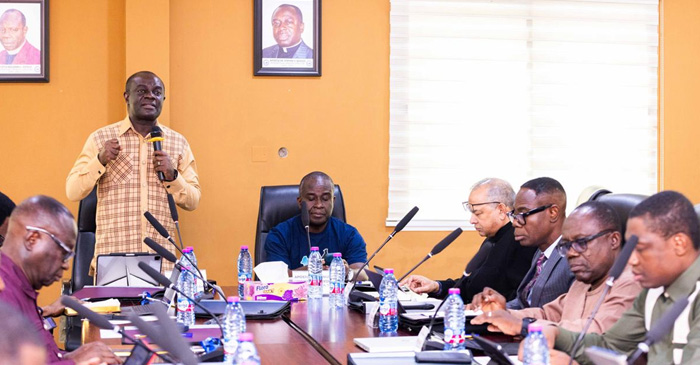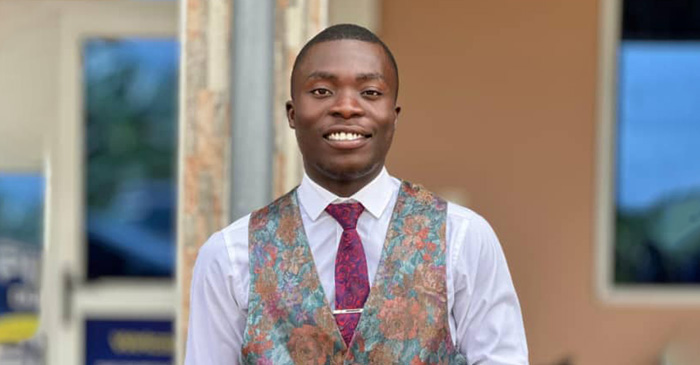
On May 13, 2021, Obed Eli Aglidza, 31, was arrested by the New Ayoma Police for attacking and robbing a mobile money vendor at Likpe Kukurantumi in the Oti Region of Ghana. Two weeks later, he was sentenced by a Jasikan Circuit Court to 12 years imprisonment with hard labour. This was after considerable evidence, including a handbag containing a specified amount of money and the mobile phone of the victim, was obtained and presented in court to implicate him.
As he was being whisked away in a police vehicle, a visibly shaken Obed could not hide his tears and cast a demeanour of one who had learnt his lesson, albeit the hard way. He would be spending the next decade of his life confined in a facility. And to turn back time, then, as he had wished, was in no mortal man’s capacity to grant.
Incarceration or imprisonment is a form of punishment one undergoes after being sentenced by the courts for committing a crime. It brings in its wake, limitations in the enjoyment of one’s personal liberties. In prison, almost everything one does may be regimented. There are scheduled times for sleeping, eating, etc., all done under the strict surveillance of a prison guard, who is tasked with locking the convict up at the stipulated time thereby curtailing his or her liberties.
Imprisonment, however, tends to be unbearably harsh and serves as double punishment when there is no access to basic essentials like decent food, toiletries, beddings, first aid, spacious cells, and a hygienic environment to retain one’s dignity are lacking.
So, we can understand why first-time convicts like Obed, who are bound to end up in this predicament, become downcast at the thought of it. A lot goes through the mind; they begin to think about the deplorable conditions they will be subjected to while at the facility and cannot help but imagine how uncomfortable life will be.
“A Den of Thieves”
For most Ghanaians (most people actually), a prison is a place where criminals are locked up and the keys thrown away, never to be seen again. For them, prison camps with inhumane conditions are the ideal habitats for lawbreakers, criminals, felons, offenders and social miscreants.
In most cases, when people seek redress for a wrong done to them, they pray the court to incarcerate the culprit as a way of exacting justice for the harm caused them. When this happens, they leave the court premises feeling relieved that their offender had “gotten what they deserved.”
This is why for most of us anytime the word “prison” comes to mind, we only think about punishment. And this is what shapes our image of the prison camp as a place of doom for the “devil’s incarnates”; a mini version of “hell” (so to speak).
With such a mindset, it is not surprising that most people believe that prisoners do not deserve anything good, so we deprive them of many things, and turn a blind eye to their plights. After all, bad people need to be disciplined and not “pampered” for wrongdoing.
It, therefore, goes without saying that the sorry state of Ghanaian prisons in our estimation is exactly how we expect the den of thieves and wrongdoers to be – overcrowded, unhygienic and with very poor living conditions – to teach lawbreakers a bitter lesson while deterring others who may be entertaining the idea of following in their footsteps.
For this very reason, the Ghanaian does not regard prisons as part of society. No! Especially since, for obvious reasons, prison camps are normally sited in the outskirts of towns and cities – usually in the middle of nowhere.
Although this might be a very legitimate way of looking at the prison system from a victim’s – someone who has suffered from the activities of miscreants – perspective, it is important to look at the bigger picture by considering why the prison system was created in the first place, what its mandate is, and how it can be more effective in meeting the security needs of the society.
Preserving Social Peace & Public Safety
Social peace is a reality in human existence. In a country with disparate people as ours, there is the need for tolerance in promoting peaceful coexistence and social cohesion. To safeguard the peace we have, rules and regulations are put in place to put everyone in check and settle disputes and conflicts that may arise from disagreements and social tensions. However, as it is common, whenever one flouts these generally accepted rules and regulations, the culprit is dealt with for disturbing the peace. This is very necessary in keeping the peace of society. The act of going against the generally accepted rules of conduct as enshrined in the constitution of Ghana is what is usually referred to as a crime. For this reason, anyone, whether young or old, who goes against these rules threatens the peace we enjoy as a people and, therefore, ought to be taken out of the society temporarily, with the aim of reforming them, so that the rest of society can go about their life in peace and with a sense of security. The process of ensuring a successful disintegration of evildoers from society is what informed the establishment of the Prisons Service as part of the Criminal Justice System.
The Criminal Justice System
The Criminal Justice System (CJS) is a network of government and private agencies intended to manage accused and convicted criminals. The criminal justice system is designed to deliver “justice for all.” This means protecting the innocent, convicting criminals, and providing a fair justice process to help keep order across the country. Ultimately, it exists to keep citizens safe. How? By ensuring that perpetrators of social wrongs are taken out of society, whipped in line, and restored after a stipulated period.
The three key actors in the CJS are the Police Service, the Judiciary and the Prisons Service. The Police Service arrests the lawbreaker and processes them for a fair trial, after which, if the accused is found guilty of the alleged crime, they would be sentenced and handed over to the Prisons Service for safe custody until the set time for their release per the court’s ruling.
As was in Obed’s case, he was arrested by the New Ayoma Police and arraigned before a court (judiciary). After the trial, he was found guilty of street robbery and was sentenced to 12 years in prison. He was then handed over to the Prisons Service to ensure his custody during the specified period.
For a better understanding, I would liken the CJS process to the treatment process of the Coronavirus. First, an individual who shows symptoms of the viral disease goes for testing. After it is confirmed that he or she has the virus, they are taken to an isolation centre to be treated and restored after recovery. The CJS is also supposed to work in a similar way, where the individual who has been sentenced for disturbing the peace of society is isolated to be rehabilitated after some time – in the case of Obed, after 12 years, or less; on grounds of good behaviour.
This means that the end process of the CJS is always to restore the culprit to society and not to cut them off completely. So, it is important to understand that the prisons, albeit situated in the outskirts of town, are pretty much an extension of society. Prisoners are incarcerated, with the ultimate objective of reforming them to conform to acceptable norms before their social reintegration. This is why most prisoners serve stipulated terms, with the view of them being reintegrated into society. So, most prisoners come back! Unfortunately, that is not the view of the Ghanaian, and this is evident in our attitudes towards the various prison camps in the country.
Unlike a COVID-19 patient who would only be allowed to rejoin society after testing negative, Obed would rejoin society after serving his prison term, whether he has been cured of his “criminal tendencies” or not.
This is the truth, whether reformed or not, most prisoners come back – sometimes sooner than we think. After serving their terms they are reintegrated into society. A key reason why the state in which they return should be of utmost concern to us all. Therefore, if the prison system is to be effective, we must pay closer attention to our prisoners; most especially, to places where they are confined during their period of incarceration and be interested in what happens there.
This is why we must change our perception of the Prisons Service as a “den for criminals” and rather see it as a “hospital for lawbreakers.” We can achieve this by gaining a better understanding of how the prison system works. This way, we would appreciate the role it plays in preserving the peace we enjoy in the country and, ultimately, see the need to resource it.
The Ghana Prisons Service
The Ghana Prisons Service is established by article 205 of the 1992 Constitution of the Republic of Ghana as part of the Criminal Justice System. It contributes to the maintenance of public safety by ensuring the safe custody of criminals convicted by the courts to terms of imprisonment. It has as its motto these three keywords which the service strives to embody: Vigilance, Humanity and Fortitude.
Currently, the Service managesa total number of 44 prison facilities with a total holding capacity of 9,945. They comprise one maximum-security prison (located at Ankaful), one medium-security prison (in Nsawam), seven central prisons, 14 local prisons, seven female prisons and 12 agricultural settlement prison camps. The service also mans a Juvenile facility for under-aged children and a Special facility for convicted persons with disabilities.
The Chief Public Relations Officer of the Ghana Prisons Service, CSP Courage Atsem, revealed in an interview that, these facilities, mostly congested and in deplorable conditions, house over 13,000 inmates including pregnant women, nursing mothers and babies. The facilities are also homes to over 1,600 unconvicted prisoners. Unconvicted prisoners, also known as remand prisoners, are persons undergoing trial for an alleged crime but have not been granted bail.
The corporate mission of the Service, that is, the reason for its existence, is to ensure the safe custody, humane treatment, reformation, rehabilitation and reintegration of these inmates to make them responsible, productive and law-abiding citizens and to foster public safety.
The Service exists to guarantee public safety and preserve the peace of society. It does this by ensuring that persons convicted of crimes are taken away from society to maintain peace. While in their custody, prisoners are to be taken care of and provided the best humane conditions to support their reformation, rehabilitation and reintegration process.
The reformation and rehabilitation of prisoners are necessary aspects of the prison system to reduce recidivism (re-offending), where the offender goes back into society and perpetuates more sinister acts that would lead them to be reconvicted. It also ensures the development of the skills of prisoners through vocational training, moral and formal education so that they would become responsible members of society upon their release.
At present, the Service is fraught with a myriad of challenges that hamper it from discharging its duties effectively and adequately. Whether or not it can effectively carry out its functions has a direct impact on the maintenance of public safety in the country. This is because when a prison system simply houses inmates and does not reform them, prisons cease to be correctional facilities and become detention camps where potential criminals are groomed. This is why the challenges of the Prisons Service must be viewed as a national security issue and given all the attention it deserves.
Challenges Militating Against Reformation of Prisoners
The challenges facing the Ghana Prisons Service are enormous, mostly interlinked, and require a substantial amount of resources to solve. Some of these challenges are as follows:
Poor and Inadequate Infrastructure: In 1850, the country had prison cells in four forts, and these held a maximum of 129 prisoners each. In 1948, there were 29 prison establishments all over the country. Today, there are 44 prisons in the country. Out of this, only a few were purposefully built as prisons. The majority were inherited from businesses or government entities –many dating to colonial times. The Yeji camp prison, for instance, used to be an abandoned clinic; Winneba prison used to be a warehouse dating back to colonial times; Koforidua prison, an armoury from the World War period; the Kumasi prison was built in 1946 and the prison at Kenyasi and Dua Yaw Nkwanta were handed to the Prisons Service by the Ministry of Agriculture. The gift of land at Kenyasi came with a solitary structure which the Service had to secure and eventually expand to house prisoners. This is just to mention a few of the 40 prisons inherited from businesses and other governmental agencies. Some of the Prisons in the northern part of Ghana are even built from mud.
Congestion: The fact that many of Ghana’s prisons were not purpose-built is a contributory factor to the acute congestion in the prisons today. Kumasi prison has a maximum holding capacity of not more than 450, but it currently holds 2,500 prisoners. Nsawam prison was initially built to hold about 850 prisoners but currently holds 3,400 inmates. This situation is not uncommon in the other prison establishments around the country. Spatial challenges, as well as a dearth of capacity, inhibit effective classification and treatment programmes—leading to a situation where different categories of prisoners as well as remand prisoners, in many instances, are lumped together in the same space. This lack of effective classification and treatment has the tendency to turn Ghana’s prisons into places where less hardened prisoners can receive training in crime by association with more hardened criminals, and upon their release potentially practice their newly acquired skills on society. This is because of the contagious nature of crime. This could be avoided if the service is well resourced. If well resourced, Ghana’s prisons can potentially be world-class centres of reformation and rehabilitation—thus fulfilling the legal mandate that set it up.
Poor Feeding: On Friday, May 21, 2021, inmates at the Sekondi Central Prisons in the Western Region staged a protest against what they described as ‘the small quantity and poor quality of food’ served them daily. The inmates, therefore, boycotted the food served them amidst chanting of war songs in the prison yard. They indicated that they were also human beings and for that matter deserved to be served with quality and delicious food. A prison official in an interview with journalists explained that the government of Ghana for years has been paying GHc1.80 per inmate for their daily feeding. To add salt to injury, the official further explained that the facility, which has a holding capacity of 400, currently houses more than 600 inmates. “So you can imagine if we have to feed over 600 inmates with that amount?” he quizzed. Having had enough, the inmates expressed their displeasure about the small quantity and poor quality of their daily food rations and their poor living conditions. The feeding situation is the same in all the other facilities in the country.
Diseases: The high level of congestion and poor conditions in the prisons due to acute lack of resources has turned the prison environment into incubators of diseases. Research shows that communicable diseases such as tuberculosis, hepatitis B and HIV/AIDS are very prevalent in Ghana’s prisons because of the above-mentioned reason. These diseases accounted for 29 of the 86 deaths recorded in all 43 inmates holding establishments in 2013. Officers, their families and the general public also are at risk of contracting these communicable diseases. Since the officers work in close contact with the inmates and live with their families in communities outside the walls of the prison, any infection contracted can easily be passed on to their families. Visitors to the prisons could also be infected with the diseases of prisoners and transmit them to the general public. Discharged inmates go back to the community and could be a source of transmission of diseases. From the above, it can be argued that prison health is a public health concern.
‘Project Efiase’
The challenges facing the Ghana Prisons Service as already stated are enormous and require a lot of resources to address. And the truth is we cannot only depend on the government to do it all. Taking all these into consideration, the Prisons Service Council took a proactive step and introduced “Project Efiase,” an initiative to create awareness about prison conditions and raise funds from corporate institutions and individuals to improve the conditions of prisons and transform them into reformation centres. Through this project, the Council seeks to educate the public about the current state of its prisons and to sensitise them about the importance of the Ghana Prisons Service to national development.
But why do Ghanaians need to take their Prisons Service more seriously—funding and resourcing it so it can achieve its mandate?
“A Hospital for Lawbreakers”
If we can all agree that the reformation of prisoners is the essence of the Prisons Service, then we should rather see it as a hospital where lawbreakers are taken for treatment and restored to society. If this is indeed the case, then it begs the questions – how would you want a hospital to look like? In what conditions would you want hospital patients to be treated?
Do not get me wrong. I am not saying that wrongdoers must not be punished, they should be. However, we must have the understanding that the punishment lies in curtailing their liberties and not by creating an inhabitable environment for them to live in. In the end, they would come back and live with us, so we ought to focus on getting them reformed so that they do not come out worse than they were admitted.
Let us also remember that the incarceration of lawbreakers is an intervention to protect public peace and safety. We are the beneficiaries of this system after all. This is why we must not only focus on who they are as criminals but prioritise how we can shape them during the period of incarceration. Until then, we may seem to be winning the battle, but losing the war.
We must begin to explore workable ways to resource the Prisons Service. We need to improve infrastructure and do our best to make the work of prison officials easier and more bearable.
This is why the criticisms levelled against The Church of Pentecost for putting up more of such facilities are unfounded. The construction of standard prisons, which the Church refers to as “correctional facilities,” directly or indirectly solves the challenges of congestion, poor infrastructure, and poor health conditions. Instead of the backlash, the Church should be supported to do more to help deal with this infrastructure deficit. Furthermore, it depicted how little people understood the Criminal Justice System and the importance of the Prisons Service in the process – It was indeed a typical Ghanaian’s way of looking at the prisons service.
“Who Watches The Watchman?”
The phrase ‘Who Watches the Watchman?” has received negative connotations in recent times. However, I am borrowing this phrase to highlight the crucial role prison officials play, and why we ought to seek their welfare.
Prison officers are personnel who ensure safe custody of the persons who have been convicted for wrongdoing. They spend more time with these persons, some of whom have been convicted of murder; all so that we can enjoy our peace. Essentially, it is a high-risk job. Here is a narrative that gives you an idea of what they have to deal with from time to time:
On Wednesday, February 4, 2014, inmates at the Kumasi Central Prison allegedly set parts of the prison on fire to escape. Unfortunately for the inmates, luck ran out on them and their plans were foiled when security was immediately beefed up to prevent them from escaping. The situation turned violent with some of the inmates hurling stones and other dangerous objects at the security personnel who had immediately gathered at the prisons to maintain sanity. You can imagine the worse possible outcome had these persons succeeded in their attempt.
This is why prison officials deserve to be supported at all cost. Often when charitable groups and churches visit the prisons, the focus is always to support the inmates, forgetting that these persons are only in safe custody because of the selfless acts of the prison officials. So next time you visit any prison facility, do not just donate items to the prisoners, make donations to the officials as well and offer words of encouragement and appreciation to them for the great work they are doing, often with the little or no support.
Beyond that, let us always remember prison officials in our prayers and promote their welfare. As they watch over our prisoners, we should also watch over them through prayers and ensuring that they are always motivated to serve.
Prisoners As Human Resources
A huge chunk of our human resources can be found in the various prison facilities in the country. According to the 2018 Annual Report of the Ghana Prisons Service, the age range of 18 to 35 years constituted 80.9% of the total population of prisoners in the country. Most of these persons could be of good use to society if they are given skills training. We should stop looking at them as discards, and rather see them as human resources who can also contribute to national development. More so when we know that not all prisoners are criminals. Indeed, there have even been some cases where an inmate is proven innocent (not culpable) after years of incarceration. So anyone could end up there; and CSP Atsem concurs: “It is perhaps a truism to say that the prisons are potentially the second home for all of us as you never know when you can find yourself at the wrong side of the Law.”
Again, let us not forget that in our prison facilities are babies (with their nursing mothers), who through no fault of theirs find themselves in such environments. This is why we must approach the prison system differently and see how we can augment the government’s efforts in promoting the welfare of inmates and ensuring that their potentials are tapped for the greater good.
The Church’s Role in Reforming Prisoners
A multi-purpose prison facility funded and constructed by The Church of Pentecost at Ejura in the Ashanti Region was commissioned on Tuesday, May 11, 2021, and handed over to the Ghana Prisons Service.
The facility, described as one of a kind in the country, was constructed at the cost of GHS 3,297,139.81. The facility, a fully furnished three dormitory block with the capacity to accommodate 300 inmates, also comprise an administration block, a chapel (which also serves as a classroom), football pitch, baptistry, modern washrooms, mechanised borehole, offices, infirmary, workshops and other auxiliary facilities, was jointly commissioned by the Interior Minister, Hon. Ambrose Dery; the Chairman of The Church of Pentecost, Apostle Eric Nyamekye, and the Chief of Ejura, Barima Osei Hwedie II.
This was one of many facilities that the Church has envisioned to set up as part of efforts to help solve some of the challenges facing the Service.
It is also refreshing to note that on Saturday, October 22, 2022, the President of the Republic of Ghana, H. E. Nana Addo Dankwa Akufo-Addo, would commission a second multipurpose facility constructed by The Church of Pentecost to be handed over to the Prisons Service for safe custody and effective reformation of prison inmates.
With the in-depth analysis made so far, I would find it very unfortunate if anyone still holds the view that the Church’s effort to support the Service is a misplaced one. If possible, other churches with the wherewithal to improve the infrastructure for the Service can also help. Maybe, aside donating food items, we can also look at doing more to help improve their living conditions. For example, in addition to visiting prisoners occasionally to offer them handouts, we could adopt cells. That is to say that a church or corporate organisation could adopt a prison cell where it would make monthly stipends to support their feeding and general welfare.
Ensuring an Effective Reformation Process for Prisoners
Although the effort by the Church in providing food items and putting up infrastructure for prisoners is lauded and encouraged, I would also like to note that the Church also bodes a help that no other organisation could provide in reforming prisoners, which is the ultimate goal of the prison system.
Indeed, the Church (Body of Christ) possesses the message that can completely transform lives for the better. This the Church must not take for granted. It is important that in demonstrating their benevolence, they do not forget the real power they possess to change the lives of the prisoners for the better. For a person to be truly reformed, he must first be regenerated, that is be “born again.”
The phrase “born again Christian” is frequently misinterpreted. Its meaning, when looking at it from a primary reference, is not about physical birth, but about experiencing spiritual rebirth (or renewal). It is an expression used by many Protestants to define the moment or process of fully accepting faith in Jesus Christ. It is when the teachings of Christianity and Jesus become real, and the “born again” acquire a personal relationship with God.
The term originates from an incident in the New Testament in which the words of Jesus were not understood by a Jewish Pharisee, Nicodemus (John 3).
Jesus replied, “Very truly I tell you, no one can see the kingdom of God unless they are born again.” “How can someone be born when they are old?” Nicodemus asked. “Surely they cannot enter a second time into their mother’s womb to be born!” Jesus answered, “Very truly I tell you, no one can enter the kingdom of God unless they are born of water and the Spirit.” – John 3:3-5, NIV
The phrase “born again” applies to people who have accepted Jesus as their Saviour or Redeemer. The convicted soul realises that he/she is a sinner (Romans 3:23) and that the penalty for that sin is death (Romans 6:23). To rectify the circumstances, God sent His only Son to die in their place, to take the punishment for sin (Romans 5:8). After Jesus’ death, He arose from the dead (1 Corinthians 15:3-6). Jesus is the only way to God (John 14:6) and He provides the blessing of salvation. Each person has the choice to receive or reject God’s gift through faith (Ephesians 2:8-9) and experience the new birth (John 3:1-8). Whoever follows Jesus as Christ, the Son of God, and has accepted His gift of life can be called Christian. That is where the journey of rebirth begins. The rebirth process is perfectly captured in Ezekiel 36:26-27:
26 I will give you a new heart and put a new spirit in you; I will remove from you your heart of stone and give you a heart of flesh. 27 And I will put my Spirit in you and move you to follow my decrees and be careful to keep my laws.”
So, being born again is having a change or transformation of the soul (heart) by the work of God’s Spirit. One’s soul is the part of our being that consists of these three: the mind (or its disposition), emotions (feelings), and our will (what we determine). This spiritual makeover when we become born-again is a change in the way we think, the way we manage our emotions, and the choices we make by our will.
This must lead to the reformation and rehabilitation process of the convicted criminals. A convicted person must accept responsibility for the wrong he or she has done and acknowledge the wrong done. They must also be ready to repent and change from their old ways. The Church has the gospel message that can convict their hearts and lead them on the journey of reformation and restoration to society. Therefore, as the Church donates food items and infrastructure to prisoners, it must also bear in mind that they have a crucial role to play in preparing prisoners for the process of reformation and rehabilitation.
This is why The Church of Pentecost must again be commended for the multifaceted nature of the prison facilities they have constructed and their approach to the reformation of prisoners. In the facility, they have constructed a chapel, which would focus on regeneration (working on the hearts of the prisoners). The church building also serves as a classroom where prisoners would be given formal education (working on the mind). The facility also has a workshop to train prisoners in skills acquisition (working on their hands) so that they would be able to work to support themselves and become responsible members of society when reintegrated.
Conclusion
This article is meant to throw some light on the Ghana Prisons Service and why we must not take it for granted. I believe that one of the reasons why the Prisons Service has not received the desired special attention is due to the lack of understanding of the role it plays in society. From this article, you have realised that the prison system is an extension of society and therefore must not be disregarded.
To be fair, I believe that some sections of the public who are opposed to the CoP’s initiative to construct prisons, do not seem to have a problem with the project per se, but with the reason why a “Christian denomination” should be engaged in this. The Church has embarked on this project because the Prisons Service needs our help, and we cannot leave all of its problems to be borne wholly by the government. Should we neglect them, we would do so at our peril. It is for this same reason that “Project Efiase” was initiated to solicit funds from every Ghanaian in the quest to improve the conditions of prisons in Ghana – the holding facilities being put up by The Church of Pentecost is exactly what Project Efiase is all about.
“The prisons administration appreciates the intervention by The Church of Pentecost in providing these modern camp prisons which would reinforce our rehabilitation efforts. As a matter of fact, the prisons personnel generally commend the Church [for this] and hope that other religious bodies and organisations would emulate their example,” Mr Atsem said, adding that “People are entitled to their own opinions, but only those of us in the Service really understand the great impact of these interventions [of the church] on the operations of the Ghana Prisons Service.”
However, it must also be said that in addition to the aid and generous acts, the Church also has a duty to minister to the hearts of prisoners through the ministration of the gospel message of Christ for a definite and a more effective reformation process.
In sum, dear Reader, when you think about the Prisons Service, think about Obed Eli Aglidza. Today, the streets of New Ayoma are a lot safer because of his incarceration. Mobile vendors in the community can now go about their duties more freely because they have one less street robber to deal with. However, we must also bear in mind that Obed would not be locked up forever, he would come back one day. In what state should he return – reformed or hardened? Certainly, I believe most of us would choose the former, but that is not for us to say, but to put in place the needed measures that would facilitate it.
Written By Prince Kojo Asare (prince.asare@thecophq.org)












